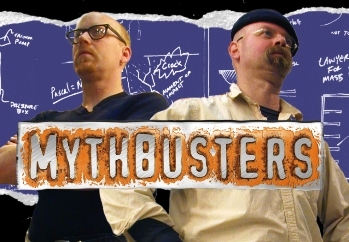The Discovery Channel’s action-packed show features science-based adventurers Jamie, Adam, Tory, Kari and Grant as they explosively (sometimes, literally) examine the scientific veracity of a variety of pop culture movie myths and old wives tales.

Their weapon of choice in determining the truth is the scientific method (along with a modest budget). According to executive producer Dan Tapster, in the seven years the show has been running (up to June 2010), the team has dispatched 738 myths by way of 2,326 experiments: 419 were “busted,” 171 “confirmed,” and 148 were deemed “plausible.”
However, while the MythBusting team is always up to any challenge, even the brains of Jamie and the brawn of Adam would be hard pressed to come up with an experiment that would satisfy many opponents on health care.
This brings me to a question that has been turning over in my head since the so-called “indoctrination” speech President Obama gave to students around the country on their first week back in school. Although posted on the internet before it was delivered, the speech was proclaimed by many to be nothing less than an inculcation of our youth of a socialist agenda. The claim turned out to be nothing less than “pants-on-fire” false.
So, here’s my question: why are so many people willing to believe what amounts to a lie in spite of the truth?
“Socialism; government takeover; the death of freedom” – these are just three of the labels given the new health care bill recently signed into law.
However, this commentary is not about the details of the health care bill. It is about an interesting Op-Ed by political scientist Brendan Nyhan that appeared in the New York Times (Mar. 25). In “The Fight is Over, the Myths Remain,” Nyhan points to the most popular myths of the health care bill: “that it provides free coverage to illegal immigrants, uses taxpayer money to subsidize abortions and mandates end-of-life counseling for the elderly.”
“While some of the more outlandish rumors may dissipate,” Nyhan writes, “it is likely that misperceptions will linger for years, hindering substantive debate over the merits of the country’s new health care system.”
Why? Well, Nyhan points to basic, human psychology.
“Studies have shown that people tend to seek out information that is consistent with their views,” he says. “Jason Reifler, a political scientist at Georgia State, and I conducted a series of experiments in which participants read mock news articles with misleading statements by a politician. Some were randomly assigned a version of the article that also contained information correcting the misleading statement.
“Our results indicate that this sort of journalistic fact-checking often fails to reduce misperceptions among ideological or partisan voters. In some cases, we found that corrections can even make misperceptions worse. For example, in one experiment we found that the proportion of conservatives who believed that President George W. Bush’s tax cuts actually increased federal revenue grew from 36 percent to 67 percent when they were provided with evidence against this claim. People seem to argue so vehemently against the corrective information that they end up strengthening the misperception in their own minds.”
While not entirely surprising, what is shocking is just how many people are willing to shamelessly manipulate any new information to fit their own agenda.
“While some provisions of the [new health care] plan will start before November,” Nyhan writes, “the most far-reaching changes won’t take effect until 2014. False claims about the contents of the bill will just morph into harder-to-debunk predictions about the consequences of reform. We’ve seen this happen already with Sarah Palin’s claim that her parents and baby would ‘have to stand in front of Obama’s ‘death panel.’’ After this claim was widely discredited in the press, some conservative pundits retreated to claims that future rationing of health care would amount to ‘de facto death panels.’
Sadly, we have only to look back at history and the effects of the communist-in-our-neighborhood lie propagated by Senator Joseph McCarthy, or the thousands that still believe that Nazi’s holocaust of the Jews was a fraud, to recognize the consequences of political propaganda.
While I still have many questions regarding health care reform, I know that the only way to confront these questions is by seeking the truth.
“There are no constraints on the human mind,” Ronald Reagan once said, “no walls around the human spirit, no barriers to our progress except those we ourselves erect.”
To those who defiantly cling to any myth over the facts, I say “Tear down your walls.”
Comments










